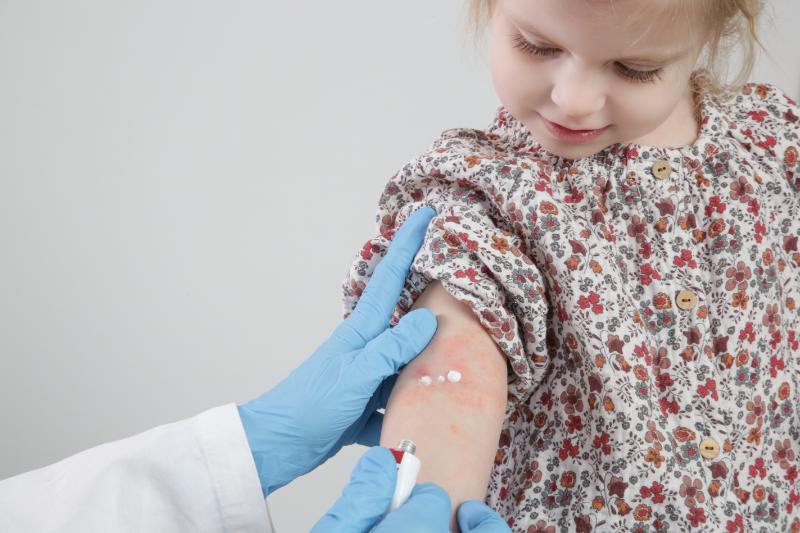Pediatric eczema is one of the most common skin issues to affect babies and children. Eczema, medically known as atopic dermatitis, is characterized by an itchy, red-colored rash that can appear on different parts of the body.
When children itch the rash-affected skin, it can cause thick brown patches to form on the skin. These thick patches are typical of eczema.
Studies show that approximately 9.6 million U.S. children under the age of 18 have eczema. It can occur in babies as well as school-aged children.
While there is no real cure for eczema, our Pediatric specialists can help your child find relief from eczema and keep their skin as itch-free as possible.
Eczema, or atopic dermatitis, is a chronic condition of the skin that affects up to 30% of children. In fact, most people with eczema experience the condition before they are six years old.
Although common in young children, eczema can occur at any age and can be a long-term condition. It is usually treated using topical, medicated ointments or creams.
Children with this condition experience dry, itchy, and inflamed skin on various parts of their body, such as:
- Face
- Scalp
- Forehead
- Chest
- Inside of the elbow
- Back of the knees
- Wrists and ankles
The inflammation and rash caused by eczema tend to come and go. The condition will often improve or even clear up completely as a child grows older. While eczema causes discomfort due to itchiness, it is not contagious and does not spread from one person to another.
Children with eczema may also be at risk of developing food allergies, hay fever, and asthma.
Eczema rash may appear different depending on the area of the body it affects. Whatever the appearance of the affected area, eczema causes severe itching of the skin.
During an eczema flare-up, some children might scratch their skin so intensely that it begins to bleed.
Common eczema symptoms in children can include:
- Dry, cracked, and scaly skin
- Itchy, red, or brownish-gray patches on skin
- Small, raised bumps on darker skin tones
- Oozing and crusting in affected areas
- Thickened, leathery skin
- Raw, sensitive skin from scratching
Eczema tends to run in families. A child with a family history of eczema is more likely to develop the condition. In some cases, the child’s skin's natural barrier function may be compromised, making it easier for irritants and allergens to penetrate the skin.
Other causes for eczema may include:
- Sensitivity to allergens like pollen, pet dander, or dust mites.
- Exposure to harsh soaps, chemicals, and irritants like wool and fragrance in moisturizers.
- Exposure to extreme weather conditions.
- An overactive or underactive immune system can increase susceptibility.
The intense itchiness caused during an eczema flare-up can be frustrating for both children and their parents.
Here are some precautions to keep in mind to minimize flare-ups:
- Minimizing contact with irritants such as wool and synthetic fibers. Use cotton and fine linen instead.
- Use soft bedding and light clothing for your baby. Avoid dressing them in too many layers.
- Use a fragrance-free soap designed for sensitive skin during bath time.
- Moisturize the skin with a fragrance-free cream after every bath for babies. Use moisturizer at least twice a day for older children.
- Trim your child’s nails to minimize scratching and additional damage.
If your child’s discomfort affects their sleep and daily activities, please schedule an appointment with your child’s doctor immediately.
When looking for medical solutions for managing eczema symptoms, avoid over-the-counter (OTC) options because some OTC lotions and creams may contain irritants that can worsen your child’s condition.
At Robertson Pediatrics, we treat your child’s eczema symptoms with the attention it needs. Possible treatment options that may help your child’s eczema can include:
- Applying topical steroid-based creams to affected areas
- Applying fragrance-free moisturizers to keep the skin hydrated
- Treating any infections with antibiotics
- Using anti-fungal and anti-inflammatory medications
Your doctor may also prescribe antihistamine medication to reduce itching at night and allow your child to have undisturbed sleep.
Eczema in children is manageable with proper care and support. At Robertson Pediatrics, we can help you recognize symptoms, implement effective treatments, and follow prevention strategies to help your child lead a more comfortable and itch-free life.
We will work with you to find the best treatment for your child’s skin! For appointments, please call Robertson Pediatrics at 310-659-8687 or contact us online.


